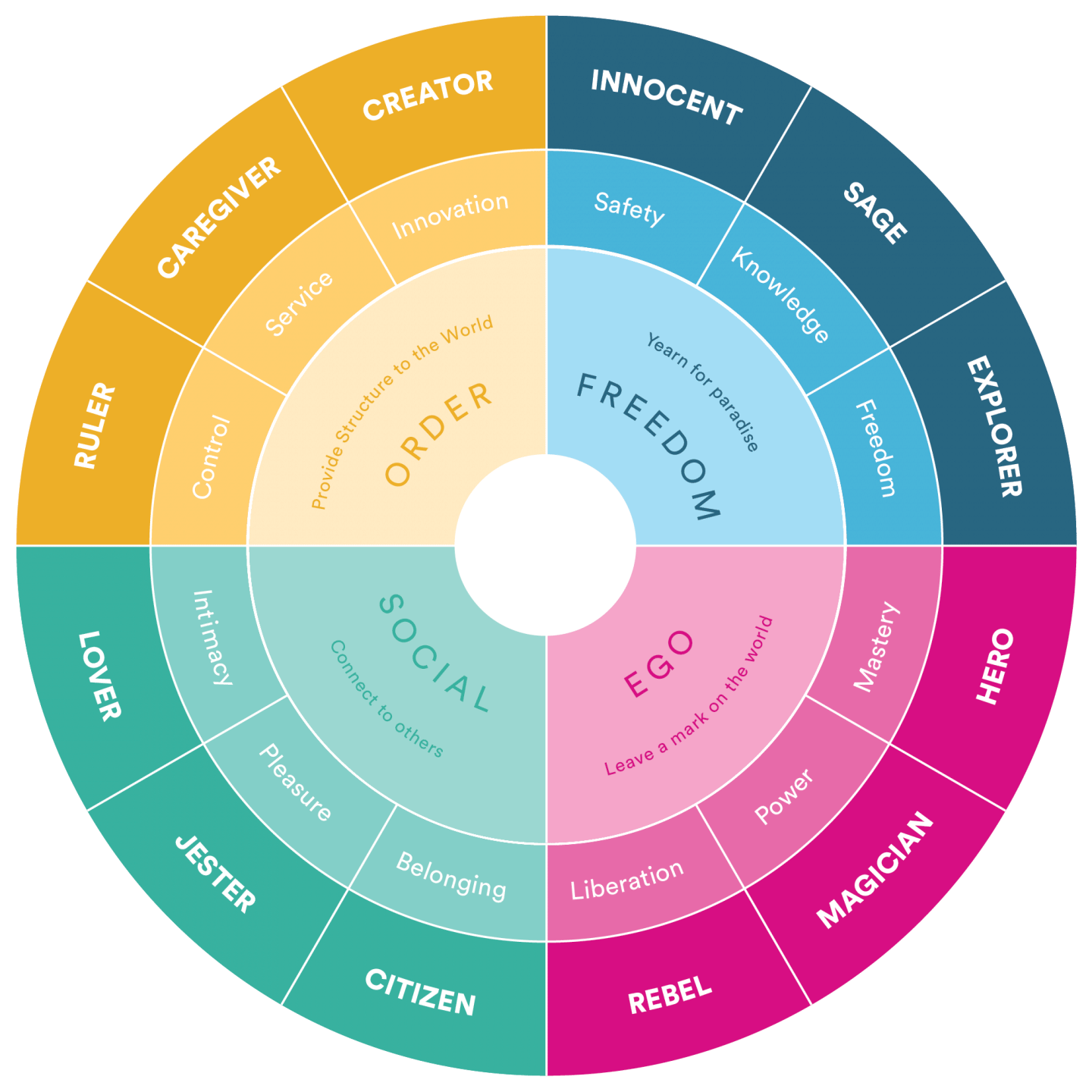The power of brand archetypes
In the world of branding and marketing, understanding and harnessing the power of archetypes can be a game-changer.
Archetypes are universal patterns and symbols deeply ingrained in our collective unconscious. They represent fundamental human desires, motivations, and behaviors that resonate across cultures and time. By aligning your brand with a specific archetype, you tap into deep-rooted emotions and connect with your audience on a profound level. In this article, we will delve into the 12 brand archetypes, explore their significance, and highlight how they can help businesses forge a unique and impactful brand identity.
The 12 Archetypes
The Innocent archetype embodies purity, simplicity, and optimism. Brands like Coca-Cola and Dove evoke a sense of nostalgia, trust, and a desire for a simpler, happier life. The Innocent archetype is useful for brands seeking to create a sense of security and inspire positive emotions.
The Hero archetype represents bravery, triumph, and the quest for greatness. Brands like Nike and BMW embody the Hero archetype, inspiring consumers to overcome challenges and achieve their goals. This archetype is powerful for brands that want to ignite motivation and empower their audience.
The Explorer archetype embodies freedom, adventure, and the desire to discover the world. Brands like Patagonia and Airbnb appeal to individuals seeking new experiences and personal growth. The Explorer archetype is ideal for brands that want to inspire exploration, self-discovery, and a sense of wonder.
The Sage archetype represents wisdom, knowledge, and introspection. Brands like Google and TED embrace the Sage archetype, providing information, insights, and guidance to their audience. This archetype is beneficial for brands that seek to educate, enlighten, and foster intellectual growth.
The Rebel archetype symbolises non-conformity, revolution, and breaking the rules. Brands like Harley-Davidson and Apple challenge the status quo, appealing to individuals who desire freedom and independence. The Rebel archetype is useful for brands that want to inspire individuality, disrupt industries, and provoke change.
The Lover archetype embodies passion, romance, and sensory experiences. Brands like Victoria's Secret and Godiva evoke desire, pleasure, and emotional connections. The Lover archetype is effective for brands that seek to create a sense of intimacy, sensuality, and emotional engagement.
The Creator archetype represents innovation, imagination, and self-expression. Brands like LEGO and Apple inspire creativity and encourage individuals to unleash their potential. The Creator archetype is valuable for brands that want to foster innovation, inspire imagination, and empower self-expression.
The Jester archetype embodies humor, spontaneity, and enjoyment. Brands like M&M's and Old Spice use humor to entertain and create memorable experiences. The Jester archetype is beneficial for brands that seek to entertain, bring joy, and create a lighthearted atmosphere.
The Caregiver archetype represents compassion, support, and nurturing. Brands like Johnson & Johnson and UNICEF exemplify the Caregiver archetype, emphasising care and protection. This archetype is powerful for brands that want to evoke feelings of trust, empathy, and social responsibility.
The Magician archetype symbolises transformation, mystique, and the power to make dreams come true. Brands like Disney and Dyson inspire wonder, imagination, and the belief in the extraordinary. The Magician archetype is useful for brands that seek to create a sense of enchantment, inspire possibilities, and ignite dreams.
The Ruler archetype embodies leadership, authority, and control. Brands like Rolex and Mercedes-Benz exude luxury, elegance, and a sense of mastery. The Ruler archetype is beneficial for brands that want to convey status, superiority, and the desire for excellence.
The Regular Guy/Girl archetype represents authenticity, relatability, and down-to-earth values. Brands like IKEA and McDonald's appeal to everyday individuals, offering products and experiences accessible to all. This archetype is effective for brands that want to create a sense of familiarity, trust, and inclusivity.
Why Are Archetypes Useful?
Archetypes are valuable tools for brand positioning, messaging, and identity. They tap into deep-seated emotions and universal narratives that resonate with individuals. By aligning your brand with a specific archetype, you create a cohesive and authentic brand identity that connects with your target audience on an emotional level. Archetypes help businesses:
Differentiate from Competitors: By embodying a unique archetype, you stand out from competitors and establish a distinct brand identity.
Create Consistency: Archetypes provide a framework for consistent messaging and visual representation across various touchpoints, ensuring a unified brand experience.
Evoke Emotion and Connection: Archetypes tap into deep-rooted emotions and create a powerful connection with your audience, fostering brand loyalty and advocacy.
Enhance Storytelling: Archetypes offer compelling narratives that enhance brand storytelling, making your brand more relatable and engaging.
Guide Decision-Making: Archetypes provide guidance and direction in decision-making processes, from product development to marketing strategies.
Understanding and leveraging the power of archetypes can be a transformative journey for your brand. By aligning your brand with a specific archetype, you tap into universal human desires and create a profound connection with your audience. Whether you embrace the Innocent, the Hero, the Sage, or any other archetype, let the power of archetypes unleash the true potential of your brand, leaving a lasting impact on your audience and differentiating you from competitors.



